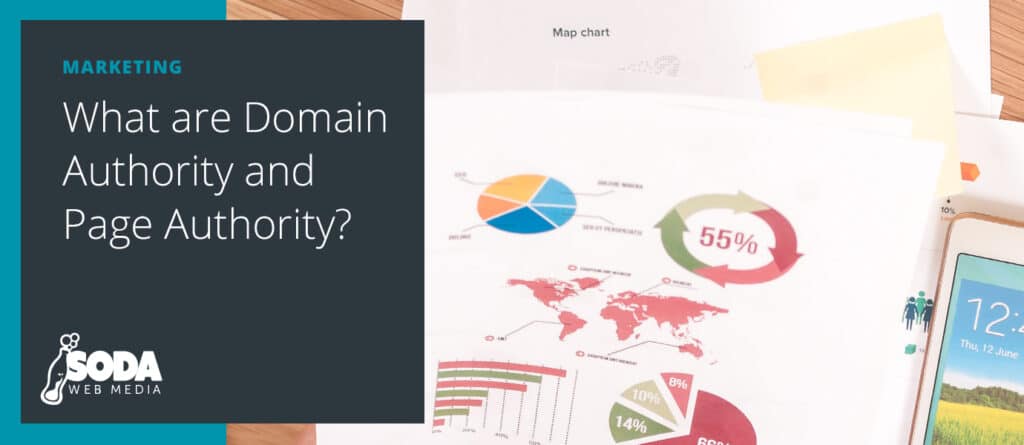If you’ve spent any time with SEO, you’ve likely heard the terms Domain Authority (DA) and Page Authority (PA). Both of these metrics provide some insight into how strong your site’s SEO is and how well you’ll rank on Google and other search engines.
Understanding your DA and PA tell you about your domain and pages can provide useful and actionable insights that can help bring your website to a larger audience. Here, we’ll cover the basics of Domain Authority and Page Authority so you can learn how to integrate them into your web toolbox.
Domain Authority
Out of the two metrics, DA is more common, so let’s start there.
What Is Domain Authority?
Domain Authority (DA) is a metric that Moz builds tools to help improve SEO, developed to predict how well a website will rank on search engine results pages (SERPs).
DA scores range from 0 to 100. Higher scores correspond to a greater probability of ranking high on the SERPs. Low scores indicate that your page may not show up high in the SERPs.
Since it is a predictive measure, it’s best used as a comparative ranking than an absolute one — you want to shoot to have a higher DA than your competitors, but you don’t need to make it your goal to get a perfect 100 DA. As long as your score is higher than your competitors, you can be fairly confident that your content will achieve its goals.
How Is Domain Authority Scored?
DA is scored from 0 to 100 using a logarithmic scale — that means that you’ll have an exponentially easier time growing your DA from 0 to 10 than you will grow it from 90 to 100. All new websites start with a DA of 1 and can grow from there.
So, what exactly happens under the hood? Essentially, Moz uses machine learning models to compare domains’ link data with real-world SERPs to determine its ranking. While DA does take a fairly holistic approach, it emphasizes links.
How Can I Check My Domain Authority?
It’s quite simple: you can either use Moz’s LinkExplorer, MozBar, or Moz’s Keyword Explorer. DA is also built into Moz campaigns and Moz’s API.
If you want to take a look at your DA, you can use Moz’s Free Domain SEO Analysis tool. click the link, enter your domain, and you’ll get your results.
How Can I Improve My Domain Authority?
Since DA is essentially a tool that ranks your domain’s SEO, all you need to do is improve its SEO with standard strategies, including on-page SEO, off-page SEO, and technical SEO.
However, the most important factor in a DA score is backlinking. To really boost your DA, you’ll want other reputable sites that have lots of backlinks to link back to your site.
You can do this by writing guest posts and running backlinking campaigns. Alternatively, you can create good content and hope that other sites eventually pick up on it and link back to you. However, this passive approach is less likely to give you the results you’re looking for.
What’s a Good Domain Authority?
DA is a relative ranking, so there is no such thing as a good or bad rating. Put simply, a “good” DA is one that’s higher than your competitors, and a bad DA is one that’s lower than your competitors.
For example, if all of your competitors have DAs between 60 and 70, you’ll want a DA that’s 71 or higher. But if all your competitors have DAs between 5 and 10, you only need a DA of 11 or more.
Remember, DA simply predicts how high your site will rank in the SERPs. If your site will rank higher than your competitors, your mission is accomplished — you can’t rank higher than first place. The only benefit of having a higher DA is that it can make it harder for your competition to catch up to you.
Page Authority
Now that we’ve covered Domain Authority, let’s move on to Page Authority.
What Is Page Authority?
Page Authority (PA) is a metric that Moz developed to forecast how well an individual page will rank on the SERPs. It’s essentially the same thing as Domain Authority, except it looks at specific pages instead of entire domains.
Like DA, PA scores range from 0 to 100, with high scores corresponding to a higher probability of ranking high in the SERPs and vice versa.
How Is Page Authority Scored?
Page Authority is scored using a logarithmic scale, which means it’s harder to improve your score from 80 to 90 than to improve it from 1 to 10. All pages start with a PA of 1.
Technically, PA functions much the same way as DA. However, it does not take on-page SEO elements like keyword usage into account. Instead, it relies more heavily on backlinking.
How Can I Check My Page Authority?
To check your PA score, you can use MozBar, LinkExplorer, or Keyword Explorer. It’s also integrated into Moz Pro campaigns and the Moz API.
The easiest way to do so is to navigate to LinkExplorer and input the URL of the page you’re interested in.
How Can I Improve My Page Authority?
Like DA, Page Authority is a holistic ranking. As such, it’s not easy to affect it directly, nor is it even desirable to do so.
The best way to improve your PA is to improve your page’s link profile by creating a better link profile through backlinks.
What’s a Good Page Authority?
PA is a relative measure, so there is no absolute “good” PA. Your goal should be to get a PA that’s higher than your competitors.
Domain Authority vs. Page Authority

DA and PA are nearly identical metrics. However, a DA score predicts how well a domain as a whole will rank in the SERPs, while a PA score predicts how well a specific webpage will rank in the SERPs.
Additionally, Domain Authority puts a greater emphasis on on-page SEO, whereas Page Authority doesn’t take on-page SEO, like keyword usage and content optimization, into account at all.
When used hand-in-hand, these two rankings can provide a lot of useful information about your domain’s and page’s SEO.
Two Steps to Boosting DA and PA

While it’s hard to boost your DA or PA directly, there are a few ways you can improve it.
Step 1: Remove Low-Quality Backlinks
Sometimes, removing obstacles is more important than creating new paths. Why go through all the work of building a new road when you can simply plow the snow off the one that already exists?
While having more backlinks is typically a good thing, getting those links through link schemes or low-quality sites can do more harm than good.
To start clearing up your site’s rep, start by looking through what Google officially considers a link scheme.
Use a tool like Ubersuggest to go through your links and remove any that reek of a link scheme. Generally, any link from a site with a DA of 40+ is ok, but you’ll want to pay closer attention to sites with a DA lower than that.
Step 2: Create Great Content and Grow Your Link Profile
Creating great content that people want to read and share is the single best thing you can do for your DA and PA scores.
Remember, Google’s algorithm is constantly trying to get better at anticipating what real, living, breathing people want to read. If you focus too much on metrics, you’ll always be lagging behind the latest update.
Instead, focus on creating solid content and let the rest follow. Sure, it’s important to include keywords and optimize your on-page SEO, but focusing entirely on numbers is a fool’s errand. Create great content, and you’ll see that webpages will naturally want to link to you.
Domain Authority and Page Authority: Key Takeaways
Domain Authority and Page Authority scores are useful indicators of how well your site will rank in the SERPs, but they need to be viewed in the context of your particular business and industry.
Businesses should strive to create unique, original, and compelling content that naturally attracts readers. DA and PA can provide insight into how well you’re reaching this goal.
Overall, it’s important to remember that DA and PA are relative rankings. Don’t strive for perfection — just try to get a score that’s higher than your competitors.

